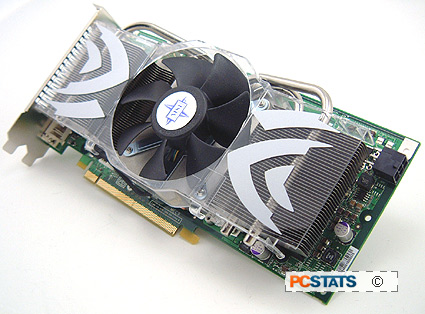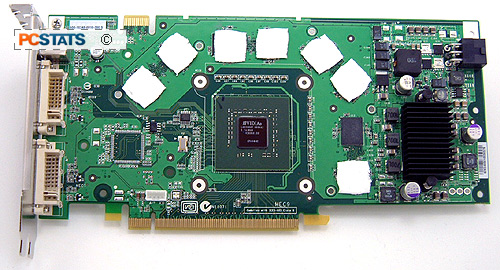High Definition content is the future of entertainment; heck Sony
is betting on HD massively by timing the release of the PlayStation 3 for 2006
when HD is set to fully explode into the lexicon of techno-geeks! Playing High
Definition content on current generation PCs can bog down the fastest processors
because there is so much more data to handle. Similar to the need for
DVD accelerators a few years back, nVIDIA PureVideo enables computer users to
view MPEG-2/DVD, H.264 and WMV HD formats without slowing the PC to a crawl.
 The PureVideo standard incorporates a hardware accelerator
for the afore mentioned MPEG-2/DVD, H.264 and Microsoft Windows Media HD
Video standards (WMV HD). According to nVIDIA's documentation on PureVideo, the
GPU (GeForce 6 and 7 series GPUs) takes on video decoding tasks from the CPU,
and the end result is smoother, shutter free HD playback. nVIDIA PureVideo also
supports most current and future high definition formats. The system seems to be
built with a good degree of future proofing for upcoming standards - as it
should be.
The PureVideo standard incorporates a hardware accelerator
for the afore mentioned MPEG-2/DVD, H.264 and Microsoft Windows Media HD
Video standards (WMV HD). According to nVIDIA's documentation on PureVideo, the
GPU (GeForce 6 and 7 series GPUs) takes on video decoding tasks from the CPU,
and the end result is smoother, shutter free HD playback. nVIDIA PureVideo also
supports most current and future high definition formats. The system seems to be
built with a good degree of future proofing for upcoming standards - as it
should be.
'H.264' is a standard that describes a next generation digital video codec which achieves very high data compressions, at a larger ratio than anything else currently available. H.264 is able to provide quality video at bit rates that are substantially lower than previous standards like MPG2, H.263, etc. To decode this much data on the fly without a hardware accelerator requires a large pool system resources. nVIDIA's GeForce 7 series supports H.264 hardware acceleration which takes the task of decoding H.264 video off the processor, placing it onto the videocard GPU which is more efficient at this task. This frees up the CPU resources to perform other tasks.
High
Definition Content Protection (HDCP) encoding is supported natively by the
'G71' GPU and is built into PureVideo as well. This means users should have no difficulty playing copy right protected high definition content on their computers at full resolution when all of this comes into play. There might not be a need for this at the moment, however Microsoft Windows Vista will require HDCP enabled hardware to play Blu-Ray/HD-DVD videos. Computer hardware that does not support HDCP will be limited to playing high definition content at lower resolutions, or in worse case scenarios, not at all.
nVidia's PureVideo is more than just a media accelerator; it also
includes features to improve video picture quality. If you believe the
marketing; DVD, cable, and satellite video provide poor crispness, clearness and
smoothness that consumers are desperate to be "saved from." PureVideo technology applies spatial temporal de-interlacing to apparently deliver a better image than traditional de-interlacing can muster. PureVideo also fixes the 3:2 pull down problem that can arise from 24 fps video being converted to 30 fps for viewing on TVs or monitors. By recovering the original 24 frame content, PureVideo apparently allows for a clearer and crisper image.

PureVideo can also scale videos to any resolution, while
maintaining a relatively detailed picture. This means users can view lower
resolution videos at a high resolution without suffering too much from blocky or
blurry pictures.
High Definition CPU Utilization Tests
To test PureVideo's HD accelerating capabilities, we
decided to play one video through Windows Media Player 10, which was downloaded
from Microsoft's WMV HD Content Showcase. The
Discoverers (IMAX) video is available in both 720P and 1080P formats, and CPU
utilization was monitored through Task Manager to give a general indication of
system load.

With the 720P version of the Discoverers video running, CPU usage
hovered between 22% and 34%. That leaves plenty of system resources for
background applications, or services, while providing high quality video.

More data needs to be computed in the 1080P version of the Discoverers video which is why CPU usage is higher. There is
still plenty of resources available for other tasks as usage jumps between 37% and
44%. Next we're onto overclocking, how high will this MSI Geforce NX7900GTX go...?
